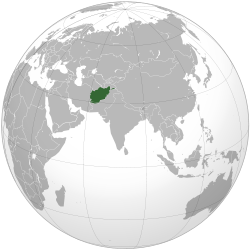Uprising Against Taliban: Has It A Future? – OpEd
By VOR
By Boris Pavlishev
An uprising against Taliban has engulfed the Gazni province in south-east Afghanistan, and the local people have pushed Taliban militants out of 50 villages. Schools and bazars started functioning in the liberated areas.
According to experts’ forecasts, the uprising might spread to other provinces such as Kandhar, Helmand and Khost in the future, but this will hardly have any impact on the current affairs of the International Security Assistance Force.

The uprising started four months ago in a largely-Pushtun populated enclave of Andar district which had previously been under tight Taliban control. Originally, the Taliban militants were welcomed warmly, but according to the local people, on the instructions from Pakistan, they imposed tough measures and closed schools and bazars. At present, attempts by Islamists to return to the enclave are being intercepted. In case of danger, militia men swiftly travel to the location on motorcycles. In fact, clashes are going on daily. Meanwhile, the ISAF is watching closely the developments but is not interfering in them. There is a reason for such a behavior, says co-chairman of the Association of Military Political Scientists, Sergei Melkov.
“The U.S. has tried to achieve a compromise with the Taliban and it could do this at one stage. It is not excluded that the non-interference of the U.S. might give it a chance in the future talks and agreements with the Taliban,” Sergei Melkov said.
In fact, the ISAF is forced to be passive. Brigadier General Lewis Boone admitted that the local people are hostile towards the Taliban and foreign forces and demonstratively emphasizes their independence. This is linked to the specific local mentality, says Professor at the Military University Oleg Kulakov.
“The largely-Pushtun populated regions have always demonstrated their independence from the central government. The central authorities have had to conclude agreements with them. There has always been parity in relations between these regions and the central government. The current events are a demonstration of the self-expression of these regions,” Oleg Kulakov said.
However, some insist that President Karzai’s men and leader of the Hizb-i-Islami group Gulbuddin Hekmatyar, who has been fighting against Hamid Karzai and ISAF since 2002, as well as the international coalition, are behind the uprising. Potentially, the uprising might spread to other provinces since this is promoted by the foreign presence, the expert said.
“At present, a game is going on for the political future in the Afghan society. Various groups are trying to gain dividends by playing with patriotic elements. Consequently, they try to show off by making certain outbursts. However, it will be difficult to cover the entire zone. The reason here is that if this zone is well-warmed up, it will affect the neighbouring Pakistan which is not interested in such a development,” Oleg Kulakov added.
Any movement that wants to provoke conflict on the entire territory of Afghanistan has reached its peak in the mid-summer. In view of this, the uprising in Gazni is coming in late and with the approach of winter it will die down. It is highly unlikely that the uprising will spread to other provinces in this season, says Oleg Kulakov. In addition, it will hardly affect strongly on the situation of the international force which has been complicated by their presence.

This “uprising” against the Taliban, if for real is to be welcomed, but let the Western Imperialists stay OUT of it. Afghanistan is at present a dogs breakfast but it is for the Afghanistanis to fix; ditto the rest of the Middle East.
At present in the region only Turkey and Iran are fully functioning nation-states; if the “West” has its way they will wreck at least one of those.